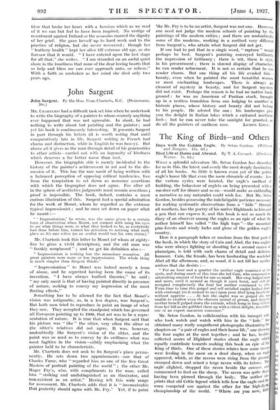John Sargent
Mn. CHARTER'S had a difficult task set him when he undertook to write the biography of a painter to whom scarcely anything ever happened that was not agreeable. In short, he had nothing to write about but painting and the painter ; and yet his book is continuously interesting. It presents Sargent in part through his letters (it is worth noting that until comparatively late in life, Sargent writing in French had charm and distinction, while in English he was heavy). But above all it gives us the man through detail of his generosities to other artists—carried out with an ingenuity- of kindness which deserves a far better name than tact.
However, the biographic side is merely incidental to the history of the painter's achievement in art and to the dis- cussion of it. This has the rare merit of being written with a balanced perception of opposing critical tendencies, free from the temptation to set down as nonsense assertions with which the biographer does not agree. For after all in the sphere of aesthetics judgments must remain assertions ; proof is impossible. The book, indeed, contains a most curious illustration of this. Sargent had a special admiration for the work of Monet, whom he regarded as the extreme typical impressionist ; and he once set down on paper what he meant
" Impressionism,' he wrote, was the name given to a certain form of observation when Monet, not content with using his eyes to see what things wore, or what they looked to be, as everybody had done before him, turned his attention to noticing what took place on his oion retina- (as an oculist would test his own vision)."
Mr. Charteris took this letter to Monet (of whom at eighty- five he gives a vivid description), and the old man was " frankly nonplussed " ; and we get his definition also :—
" Impressionism is nothing but the immediate sensation. All great painters were more or less impressionist. The whole thing is much simpler than Sargent thinks."
" Impressionism " to Monet was indeed merely a term of abuse, and he regretted having been the cause of its invention. " I have always loathed theories," he said ; " my only merit is that of having painted directly in presence of nature, seeking to convey my impression of the most fleeting effects."
Something has to be allowed for the fact that Monet's vision was astigmatic, as, in a less degree, was Sargent's. But both men tried to reproduce in paint an image of what they saw. They accepted the standpoint which has governed all European painting up to 1900, that art was to be .a repre- sentation of nature. It is true that when Sargent said that his picture was " like " the sitter, very often the sitter or the sitter's relatives did not agree. It was, however, undoubtedly like Sargent's vision of the sitter, and the paint was so used as to convey by its swiftness what was most fugitive in the vision—subtly emphasizing what the painter held to be characteristic.
Mr.* Charteris does not seek to fix Sargent's place perma- nently. He sets down two appraisements---one that of Charles Furse, who "regarded him as one of the five Great Masters of portrait painting of the world " ; the other Mr. Roger Fry's, who, with compliments to the man, called him " striking and undistinguished as an illustrator, and non-existent as an artist." Having left- this wide -range for assessment, Mr. Charteris adds that it is " inconceivable that posterity should agree with Mr. Fry." Yet, if to paint
like Mr. Fry is to be an artist, Sargent was not one. However, one need not judge the modern schools of painting by the paintings of the modern critics ; and there are Undoubtedly some of the moderns, working in a method very different from Sargent's, who attain what Sargent did not get.
If one had to put that in a single word, " rapture " would perhaps be best. Sargent's painting conveyed brilliantly the impression of brilliancy ; there is wit, there is style, in his presentment ; there is shrewd display of character; he can render refinement. It is not so certain that he can render charm. But one thing all his life evaded him— beauty, even when he painted the most beautiful women or most enchanting landscapes. There is alWays an element of mystery in beauty, and for Sargent mystery did not exist. Perhaps the reason is he had no native back. ground : he was an American of Puritan stock, brought up in a restless transition from one lodging to another in historic places, whose history and beauty did not belong to his people. He adored the sun ; his landscapes give you the delight in Italian lakes which a .cultured northern feels ; but he can never take the sunlight for granted, as
do all the painters of southern race. LE3ION GREY.






































 Previous page
Previous page